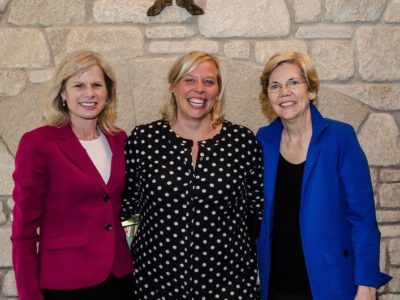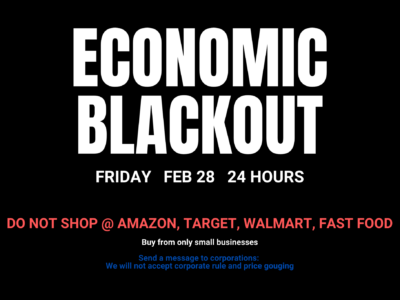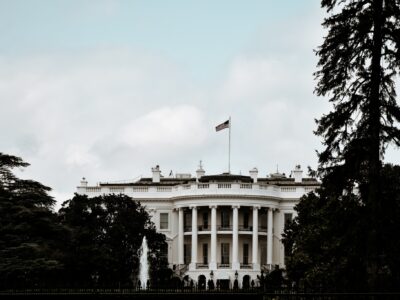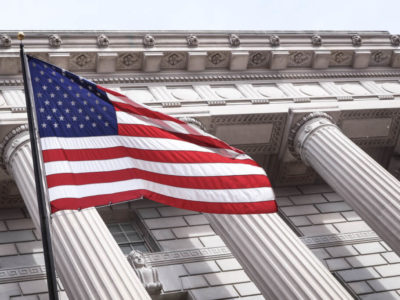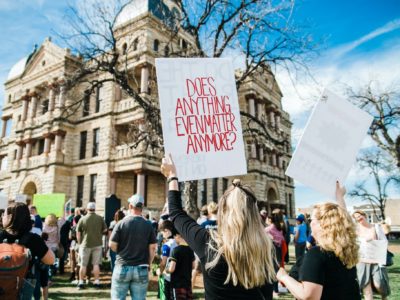Heather Colburn will hold your hand. When you decide to run for office she will be there with you every step of the way. She first became involved in politics on Senator Tammy Baldwin’s campaign during her time as an undergraduate at the University of Wisconsin-Madison and hasn’t slowed down since. After working as a political consultant for the likes of Hillary Clinton and Elizabeth Warren, she continues to push tirelessly towards lifting strong female candidates up into offices where they can make real change.
Heather Colburn Career Timeline
1998 – Worked on Senator Tammy Baldwin’s campaign
1999 – Became the major gifts and events director for Emily’s List
2005 – Founded Colburn Consulting
2006 – Worked as a deputy campaign manager for Fair Wisconsin
2011 – Founded Rapid Returns
2013 – Became a political and financial advisor for Emily’s List
Q&A with Inspirational Women Leader Heather Colburn
Q: At College Magazine we’re working together with EMILY’s List, Emerge America, Human Rights Campaign, Higher Heights, She Should Run, Victory Fund and IGNITE on an initiative to fight for equal representation in congress called “50 by 2050.” What are your thoughts on the goal of achieving 50% of women in Congress by 2050?
A: I think the goals are amazing. These match up with my personal goal in life, which is to keep working towards electing women until we reach parity. We have to pedal to the metal this and we have a great opportunity with the redistricting election in 2018 to make a big jump towards parity.
Q: What inspired you to get involved in the political sphere?
A: I was a political science major in college, just because I was passionate about the issues. One day this little known woman, Tammy Baldwin, came to speak to our class, she was serving the state assembly, and just what she had to say about the issues was so compelling and it sort of made me match up that not only do you need someone to be right on the issues, but deliver the messaging on the issues and really inspire people to be part of the process.
After that I wanted to intern in her office and we could do that through school and we made that work, and it was then that she decided to run for Congress. And I worked on the campaign, first as an intern and it was just one of those experiences where you could really see that a bunch of people coming together with a similar purpose and passion could really made a difference in political society. And that has created a naivety in me that I haven’t let leave my system.
Q: Can you speak a bit more about your experience working under Senator Baldwin?
A: When she ran we hadn’t elected a woman to Congress or an openly gay person to Congress, so there was a lot of energy around her election. When she first got in the race, no one believed that she could win. She was young, she was a woman, she was gay. And there were these other two candidates in the race that were established men. We always joked her title in the newspaper was like, “Tammy Baldwin, Longshot Lesbian Running for Congress.” As can happen in politics, those kinds of things can fuel the fire and I think that just made a bunch of us more determined, so we just took it from there, and obviously she won so it was exciting.
Q: What issues are you most passionate about?
A: It’s kind of funny because that changed with my age. When I was that young, I was very passionate about educational policy and I felt like I was a nerd about it and I felt like we did things wrong in America and we needed to fix that and I was also very passionately pro-choice. The older I get, I have kind of put choice at the fore-front of my issue ranking and I think that comes from an understanding that if women can’t decide how and when they want to get pregnant, they can’t decide anything else about their lives. And that we need to protect that right first.
Q: Can you speak a bit about your journey as a consultant and how that started for you?
A: It was maybe a bit more accidental than most. I was living in D.C., I had worked at Emily’s List for 7 years and just loved—it had cemented for me that what I wanted to do with my, both personal and professional, life was help women get more power and make a bigger difference in their communities. I knew I wanted to do that, but when I left Emily’s List, I wasn’t sure how.
Someone at the Human Rights Campaign had said, “Ok, why don’t you come over here?” At the time there were a lot of ballot measures to define marriage as between a man and a woman, and I kind of liked to work on those as a consultant, and then other people said, “Oh, do you want to come over here and help this woman who’s running?” And there I went.
In 2012, I had partnered with someone I met at Emily’s List to start a fundraising, direct-mail business. That was sort of my first company that I started to help elect women. At that company we do fundraising mail for women who run for the United States Senate primarily.
I feel very fortunate that I get to do things I’m passionate for people I’m passionate about.
Q: At College Magazine we consider ourselves the guide to the undergraduate experience. How do you think your time at the University of Wisconsin helped shape your experience in politics and public service?
A: It’s a very political school by nature. It’s a very liberal and active community. When I was going to school there I actually campaigned for the first time on campus—the year Bill Clinton was running for re-election, I believe. I used to be active a lot in student government, so this was like student government on cocaine. UW was a perfect match for me as far as introducing me to the power of politics.
Q: We’ve seen a lot more women running for office over the last few months. How do you think that will end up shaping our political landscape?
A: I think it will make a significant change. Women get elected through primaries. They have to run against people in their own party in races to get their voice to a general election. So when we have more women running, the likelihood of engagement in primaries is much higher. That means we’ll have more women in general elections. The general public is obviously more used to seeing women run and women win and serve and that is helpful. I think that a lot of work over the past 25-30 years has really led up to this time where more women want to run and can run and can also put together a winning campaign as well. I think this is an exciting time. And I hope that by 2050—this moment in time can really help give a boost to that cause.
Q: Can you speak a little bit about your journey with Rapid Returns?
A: We had always had an interest in the tool. We thought we could bring something new to fundraising for women candidates and it was something my business partner and I had done for a really long time. So we thought, “Let’s try it.” We went out and kind of put together the company and materials. Believe it or not, our first cycle in business, Elizabeth Warren was our client.
It just really shows, I mean I think for me a big lesson in politics is be nice and kind to everyone. Be kind to the people that work alongside you. Many of those people are the ones who will say, “Yes, they’re wonderful,” for your next job or consulting contract. I think we had a good reputation and it just worked.
Q: How did you get involved with Emily’s List and what does that partnership look like?
A: It’s honestly something that I care about and value at a very high level in my life. When I worked on Tammy’s race, we had a person link and they promoted me to be in charge of her fundraising when I was 21 years old and just out of college and had never had another political job. Emily’s List really cared about that race and they were really involved. It was where I met my mentor and a lot of people who are still in my life today. They really helped me be who I was.
After that, I had moved to D.C. and taken another job and the opportunity came up to work there, and I just couldn’t say no. I was just thrilled and worked there for 7 years, moved up the ranks, ran a department when I left which was very cool. We are always on team Emily for sure. I still do all of their fundraising training and teach other people who are in my same situation how to go out to races and raise the money it’s going to take to win.
Q: Do you have a moment or a project that you were involved in that has been the most rewarding of your career so far?
A: The Tammy one is the obvious one—so let’s pick a different one. Obviously that shaped my life, to work that hard at that age and have us win taught me something about the world. When I was working at Emily’s List, I was able, I was raising money for Emily’s List and I said, “I really want to work on this race that’s happening in Wisconsin.” And they let me work on this woman who was running for Congress at that time, Gwen Moore. Gwen is now in Congress and is just very herself and she has been an awesome person—was on welfare as a young person, struggling to raise her family. She just doesn’t come up from the ranks that sometimes white privilege hands to our candidates. She struggled to get her way there.
Working on that race, to me, was a lesson in life: no woman candidate is alike. So how do we help each individual be great instead of looking for this sort of universal truth? But also just the difference that different voices add to Congress. Gwen Moore, ever since the day she was elected until now has never been just another person in Congress. And that voice that she brings is invaluable to the policy making process but also to the political process of saying to other women who do not fit a white box, “No, no, no, this party’s for you too. Come on board.” She’s just herself, and I f**king love that.
Q: What issues have you seen women having because of that element of their candidacy? What particular issues have you seen women have in politics?
A: The biggest thing that I’m onto right now is that they’ll think they want to run, they’ll go get training, they’ll think it through, and then something gets in the way. Sometimes that is real life—partner, kids, a job they don’t feel like they can leave. Sometimes that’s their own mental discussion over, “I don’t know enough. How could I possibly run? What will the negative effect be on my life and family?” All of those things.
We as women need to band together and say, “I’ve got your back if you do this.” If you want to run and you’re worried about your kids’ school pickup, let’s get that done. If you’re worried about, you don’t know enough, let’s get your briefing book made. There’s all kinds of ways we can “It Takes a Village” these women and we’ve got to do that—because once they leap off that cliff, I want them to be holding my hand. I don’t want them to feel alone.
Q: Is there anything else you’d like to add?
A: Women should go out and make a difference in the world in whatever way that speaks to them. Running for office, supporting women who run for office, volunteering at a Planned Parenthood clinic or college republicans—any of it. Just do something that makes the world a better place.
How to Become a Powerful Woman Leader
1. Find your own path
“There are so many places that do work to change the world that rely on politics as a piece of that to make that change,” said Colburn. “Find something that gets you a little excited because you’ll stay there longer, you’ll learn more, you’ll put in more energy, and you’ll meet other people like you who share that same passion, who will end up being a part of your life for a long time. Don’t go the prescribed route.”
2. Talk to the people around you
“Ask a lot of questions of anyone that you think is cool. People are often willing to talk about themselves and their path, and if you can find a mentor or even someone informally who, when you leave college, is willing to be an advocate for you, that goes a long way in politics,” said Colburn.
How to Connect with Heather Colburn
Email her via Rapid Returns: https://www.rapidreturnsmail.com/copy-of-contact
Write her a letter or give her a call:
Rapid Returns
2633 Lincoln Blvd. #725
Santa Monica, CA 90405
415.308.5849
1324 Spaight Street
Madison, WI 53703
202.415.5486

